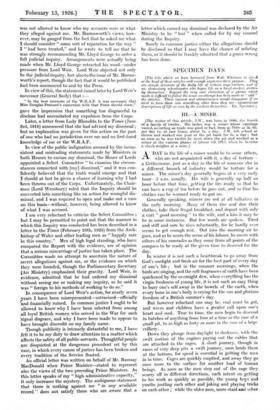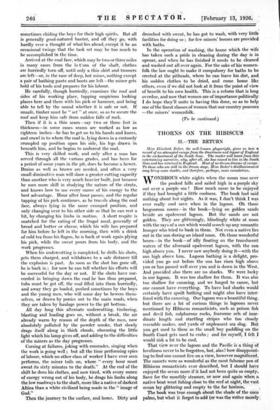SPECIMEN DAYS
[The title which we have borrowed from Walt Whitman to stand at the head of these articles well enough expresses their purpose. They are simple accounts of the daily life of certain wage-earners, and of an elementary schoolmaster who began life as a hand-worker, written by themselves. Beyond the very rare correction of a phrase which made it difficult to follow the sense no attempt has been made to "edit" the articles. Their interest and attractiveness would disappear if we tried to turn them into something other than they are--epontaneous descriptions of life as seen by the workers themselves. -En. Spectator.]
111.—A MINER.
[The writer of this article, S.W., was born in 1886, the fourth of a family of twelve. His father was a miner whose earnings varied, according as trade was good or bad, from as little as 30.8d. per day to, at rare times, about 78. a day. J.W. left school at eleven and worked one year at the pit bank for Is. a day ; but as soon as he was twelve be went down the pit and worked as a miner at the various phases of labour till 1915, when he became a check-weigher at a mine.] ADAY in the life of a miner would be to some others, who are not acquainted with it, a day of torture— a Gethsemane, just as a day in the life of someone else in a different branch of industry would be torture for a miner. The miner's day generally begins at a very early hour-5 a.m. usually. His wife is generally up half an hour before that time, getting the fire ready so that he can have a cup of tea before he goes out, and so that his clothes can be warmed ready to put on.
Generally speaking, :miners are not at all talkative. in the early morning. Many of them rise and don their clothes, take their frugal breakfast, and depart with only a curt "good morning" to the wife, and a kiss it may be be in some instances. But few words arc spoken. Tired and stiff and sore he rises reluctantly, for he hardly ever seems to get enough rest. Out into the morning air he goes, and as he nears the scene of his labour, he meets with others of his comrades as they come from all points of the compass to be ready at the given time to descend for the day.
In winter it is not such a heartbreak to go away from God's sunlight and fresh air for the best part of every day of one's life ; but in the summer mornings, when the birds are singing, and the soft fragrances of earth have been 'quickened by the overnight dew, when everything has the .virgin freshness of young life, it is not such an easy thing to bury one's self away in the bowels of the earth, when every bone in one's body is crying for the sun and glorious freedom of a British summer's day.
But however reluctant one may be, coal must be got, and wives and children have a greater call upon one's heart and soul. True to time, the men begin to descend in batches of anything from four at a time in the case of a small pit, to as high as forty or more in the case of a large colliery. Down they plunge from daylight to darkness, with the swift .motion of the engines paying out the Cables that are attached to the cages. A short journey, though in cases of very deep pits a swift journey, soon lands them at the bottom, for speed is essential in getting the Men in in time. Cages are quickly emptied, and away they go .once more to the surface for another . load of Inithan beings. As soon as the men step out of the cage they scurry off in different directions, -eaCh intent on getting to his work as quickly as possible, the young boys - and youths jostling each other and joking and playing tricks on each other ; while the older men, more staid and sober sometimes chiding the boys for their high spirits. But all is generally good-natured banter, and off they go, with hardly ever a thought of what lies ahead, except it be an occasional twinge that the task set may be too much to be accomplished in the time.
Arrived at the coal face, which may be two or three miles in many cases from the batom of the shaft, clothes are hurriedly torn off, until only a thin shirt and trousers are left—or, in the case of deep, hot mines, nothing except a pair of bathing pants and boots are left—the miner gets hold of his tools and prepares for his labour.
He carefully, though hurriedly, examines the roof and sides of his working place, tapping suspicious looking places here and there with his pick or hammer, and being able to tell by the sound whether it is safe or not. If unsafe, timber must be" set" at once, so as to secure the roof and keep him safe from sudden falls of rock.
Then if it is a thin seam—say two or three feet in thickness—in some cases seams are worked as low as eighteen inches—he has to get on to his hands and knees, and crawl in to where the coal is, lying down in a curiously crumpled up position upon his side, his legs drawn in beneath him, and he begins to undercut the coal.
This is very skilled work, and only after a man has served through all the various grades, and has been for a period of some years in the pit, does he become a hewer.
Brains as well as brawn arc needed, and often a very small diminutive man will show a greater cutting capacity than another who is very much heavier built, just because he uses more skill in studying the nature of the strata, and knows how to use every ounce of his energy to the best advantage. Hour after hour passes, and the regular tapping of his pick continues, as he travels along the coal face, always lying in the same cramped position, and only changing over to his other side so that he can rest a bit, by changing his limbs in motion. A short respite is snatched for the eating of the frugal meal, generally of bread and butter or cheese, which his wife has prepared for him before he left in the morning, then with a drink of cold tea from his flagon, he is back at work again plying his pick, while the sweat pours from his body, and the work progresses.
When his undercutting is completed, he drills his shots, gets them charged, and withdraws to a safe distance till the explosion is past. As soon as the shot has gone off, he is back in ; for now he can tell whether his efforts will be successful for the day or not. If the shots have suc- ceeded in bringing down the coal he has thus prepared, tubs must be got off, the coal filled into them hurriedly, and away they go loaded, pushed sometimes by the boys and the young men, who will some day be hewers them- selves, or drawn by ponies out to the main roads, when they are taken by haulage power to the pit bottom.
All day long this alternate undercutting, timbering, blasting and loading goes on, without a break, the air already warm by reason of the depth of the men, now absolutely polluted by the powder smoke, that slowly drags itself along in thick clouds, obscuring the little light which his lamp gives off, and adding to the difficulties of the miners as the day progresses.
Cursing at failures, joking with comrades, singing when the work is going well ; but all the time performing epics of labour, which no other class of worker I have ever seen performs, the miner toils on, where "every hour must sweat its sixty minutes to the death." At the end of the shift he dons his clothes, and now tired, with every ounce of energy wrung out of his body, he drags his limbs along the low roadways to the shaft, more like a native of darkest Africa than a white civilized being made in the" image of God." - Then the journey to the surface, and home. Dirty and drenched with sweat, he has got to wash, with very little facilities for doing so ; for few miners' houses are provided with baths.
In the operation of washing, the house which the wife has taken such a pride in cleaning during the day is in uproar,_and when he has finished it needs to be cleaned and washed out all over again. For the sake of his women- folk the law ought to make it compulsory for baths to be erected at the pitheads, where he can leave his dirt, and his sodden clothes to be dried, and come home like others, even if we did not look at it from the point of view of benefit to his own health. This is a reform that is long overdue, and now that women are of importance politically I do hope they'll unite in having this done, so as to help one of the finest classes of women that our country posesses —the miners' womenfolk.
(To be continued.)



















































 Previous page
Previous page